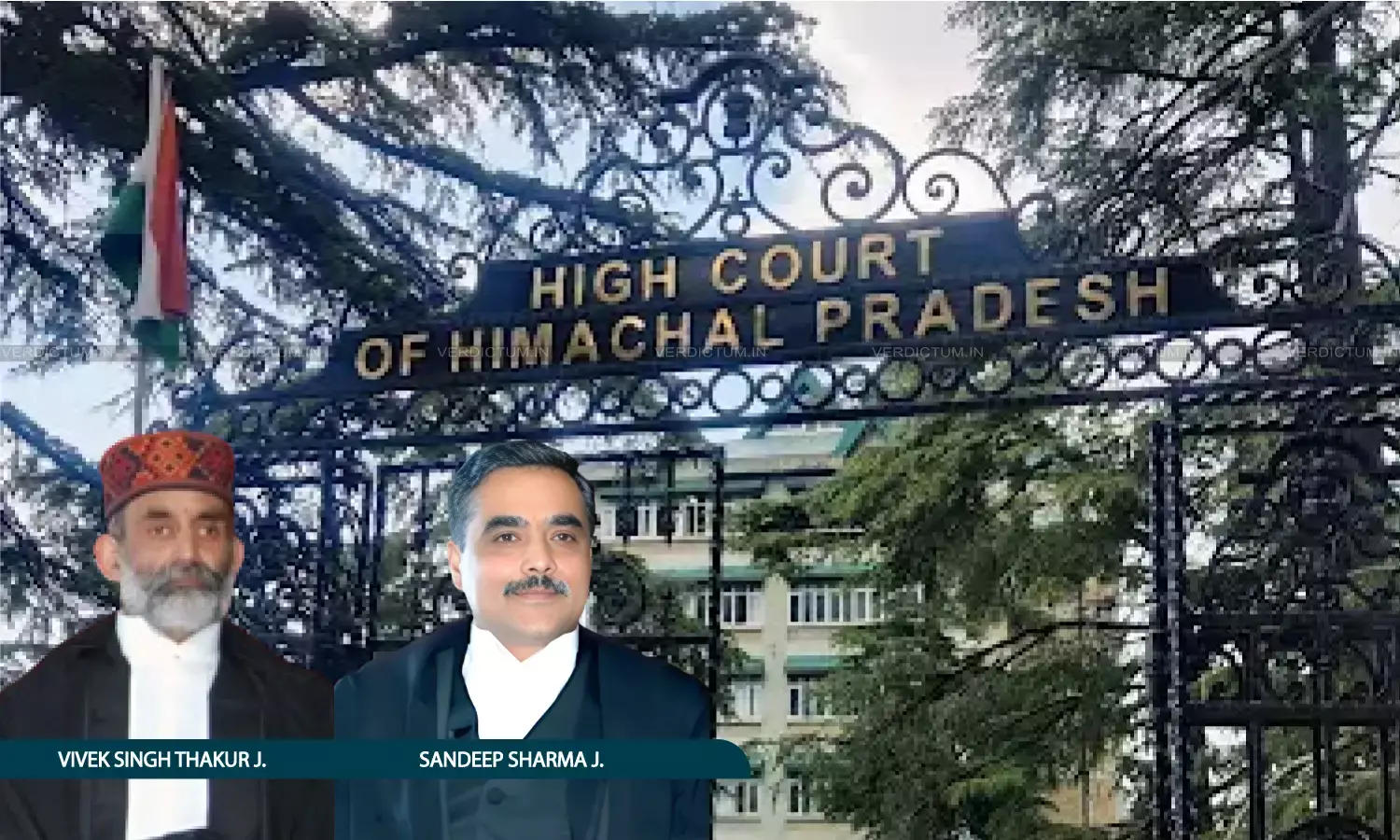Candidates Estopped From Assailing Criteria After Being Declared Unsuccessful: Himachal Pradesh High Court Rejects Petitions Of Judicial Officers
The petitions before the Himachal Pradesh High Court had been filed seeking direction to amend Clause 6(i) of Himachal Pradesh Judicial Service (Promotion from amongst Civil Judges, (Sr. Division) to the posts of District/Additional District Judges on the basis of limited Competitive Examination) Regulations, 2005,

Justice Vivek Singh Thakur, Justice Sandeep Sharma, Himachal Pradesh High Court
While dismissing a challenge against the examination held for the appointment to the posts of District Judges/Additional District Judges, the Himachal Pradesh High Court has observed that the candidates are estopped from assailing the Regulation in question or challenging the criteria after being declared unsuccessful.
These petitions before the Himachal Pradesh High Court had been filed seeking direction to amend Clause 6(i) of Himachal Pradesh Judicial Service (Promotion from amongst Civil Judges, (Sr. Division) to the posts of District/Additional District Judges on the basis of limited Competitive Examination) Regulations, 2005, for reducing the qualifying criteria in the written examination from minimum of 60% in each individual paper and minimum aggregate of 66% marks in all papers, for becoming eligible for accelerated promotion/appointment to the post of Additional District Judge through the mode of limited competitive examination; and instead to provide minimum of 50% in each individual paper and minimum aggregate of 55% marks in all papers put together.
The Division Bench of Justice Vivek Singh Thakur and Justice Sandeep Sharma observed, “For challenging the criteria only after being declared unsuccessful, petitioners are estopped by their act and conduct from assailing the Regulation in question and on this sole ground, petitions deserve to be rejected particularly when the petitioners belong to class of Judicial Officers who are supposed and expected to be well-versed with consequences of participating in the selection process without any protest and filing the petitions only after failing in qualifying the written Examination.”
Reference was made to the judgments in Anupal Singh and others vs. Sate of Uttar Pradesh through Principal Secretary, Personnel Department and others (2020) and Dr.G. Sarana vs. University of Lucknow and others (1976).
Senior Advocate Sanjeev Bhushan represented the Petitioner, while Senior Advocate Ajay Sharma represented the Respondent.
Factual Background
The Petitioner participated in the process undertaken by the High Court in the year 2009 for promotion by way of a limited competitive examination. He scored 169 and 116 in Paper-1 and Paper-2, respectively and in aggregate 285 marks, but he failed to obtain the minimum 60% marks in Paper-2 and therefore, despite having obtained more than 66% marks in aggregate, he was declared not qualified. Respondent 2 had obtained 150 and 126 marks in Paper-1 and Paper-2, respectively and 276 in aggregate, but for fulfilling the criteria of 60% marks in each paper and 66% in aggregate, he was declared qualified. The petitioners’ representation seeking a grant of 1% as grace marks in relaxation of the Rules to declare him qualified in the written examination was rejected.
In another writ petition, the petitioner sought quashing of criteria providing 60% marks in each paper and 66% in aggregate to qualify limited competitive examination for the post of District Judge/Additional District Judge and also sought a direction to the respondents to lower down the minimum qualifying marks criteria through limited competitive examination bringing it at par with minimum qualifying marks criteria prescribed for direct recruitment.
Reasoning
The Bench noted that in both the petitions, the petitioners participated in the selection process without any protest, knowing fully well that there were different criteria provided for qualifying written examination for direct recruits and in-service candidates through a limited competitive examination. “Petitioners in both petitions have been agitating and criticizing the criteria providing higher bench marks for promotion through limited competitive examination after being declared not qualified. Before that, they were not aggrieved at all. Rather, they were taking chance of getting selected through process as existing and as notified”, it said.
The Bench further noted that in one of the Petitions, though additional ground had been taken that more than dozen questions were having either wrong answers or some were wrongly framed but there was no whisper except one line in the entire petition and even there was no prayer made to exclude the so called questions having wrong answers or wrongly framed.
“It is also settled that replication or rejoinder is not a substitute for amendment. A new cause of action or plea or a new fact should be incorporated in the original petition/plaint itself and the material facts and particulars stated in rejoinder/replication for the first time which were not forming the part of averment made in main petition cannot be tried and cannot be made the subject matter for adjudicating the rival contentions of parties”, it further held.
With respect to the plea of petitioner that the Constitution has not been prescribed and notified in the subject and syllabus and thus questions related to Constitution were beyond the syllabus was, according to the Bench, not tenable as the High Court putforth in reply stating that perusal of syllabus categorically reflected that under the Heading of General Knowledge, the knowledge of candidate is tested concerning History, Geography, current affairs, development in the recent past, science and technology etc. and knowledge of the Constitution would come within the purview of expression “General Knowledge” as is contemplated in the syllabus.
Thus, finding no merit in the Petitions, the Bench dismissed the same.
Cause Title: Rajesh Kumar Verma v. Hon’ble High Court of HP (Neutral Citation: 2025:HHC:21617-DB)
Appearance
Appellants: Senior Advocate Sanjeev Bhushan, Advocate Sparsh Bhushan
Respondents: Senior Advocate Sanjeev Kuthiala, Advocates Chandernarayana Singh, Diwan Singh Negi, Rachna Kuthiala

